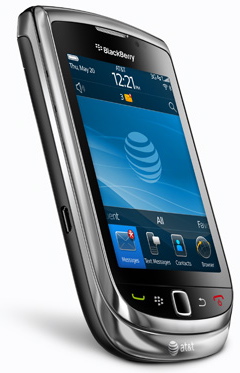
Skype founders launch mobile subscription music service
Skype, Kazaa, and Joost creators Janus Friis with Niklas Zennström launched Rdio on Tuesday, aiming to offer an inexpensive way to provide unlimited streaming music from mobile phones. In addition, the service would allow users to save music to their device for offline listening.
The service costs $4.95 per month for desktop-only access, and $9.95 monthly for both desktop and mobile use. The company has about seven million songs in its database, and unlimited streaming. Users can select songs to be synced to their devices for online listening, or download copies of the song to keep at a cost of 99 cents per track.

RIM debuts its first slider, BlackBerry 6 device: Torch 9800
AT&T and Research in Motion Tuesday morning officially debuted the new BlackBerry Torch, the first BlackBerry to use the portrait slider form factor and the first device to launch with BlackBerry 6 OS.
After many months of unofficial reports and spy camera shots of the device, today the Torch officially went live. It features the standard BlackBerry keyboard hidden under a 3.2" capacitive touchscreen similar to the Palm Pre. It has 512MB of RAM and 4GB of built-in memory expandable via microSD, a 5 megapixel camera, Bluetooth 2.1, GPS, and 802.11 b/g/n. The wireless radios inside include UMTS: 2100/1900/850/800 MHz, and GSM/GPRS/EDGE: 850/900/1800/1900MHz.

Report: US wireless carriers looking to replace credit cards
Three national wireless carriers are teaming up with Discover and Barclay's on a pilot program which aims to enable consumers to use their smartphones as payment devices, sources have told Bloomberg News Service. AT&T, Verizon Wireless, and T-Mobile are planning to test the functionality in select markets.
Little is known about the potential service other than one of the pilot cities being Atlanta, and that the venture is currently searching for an executive to head up the new company. In any case, it could shake up the entire retail industry.

Android experiences unprecedented U.S. growth, next stop China?
Independent tech analyst group Canalys issued its own analysis of the smartphone industry on Monday, which found that Android-based handsets experienced an incredible 886% growth worldwide during the second quarter of 2010.
In July, market research firm GfK announced it had tracked a 350% growth in Android shipments in the UK, bringing it to a 13.2% share of the postpaid market. During the same quarter in the United States, Canalys says Android shipments increased by 851%, which dove it to a 34% market share, ahead of both the iPhone and BlackBerry devices.

Jailbreakme.com returns, iPhone 4 finally jailbroken
The iPhone Dev Team has struck again, this time releasing a Web-based jailbreaking solution that is compatible with all iPhone models, including the iPhone 4. The solution requires only an Internet connection and mobile Safari to complete the hack.
It should be noted that this only allows for the installation of unapproved apps to the device, and not the use of the device on unsupported carriers. The Dev Team said in a blog post Sunday that a version of ultrasn0w -- the carrier unlock -- would be compatible with iPhone 4 shortly.

E-mail filtering software Cloudmark Desktop becomes DesktopOne
Cloudmark today announced an update to its e-mail filtering software for Outlook, Outlook Express, Thunderbird 3, Windows Mail, and Windows Live Mail. The software, formerly known as Cloudmark Desktop, is now called Cloudmark DesktopOne, and unlike previous versions, the shareware version can now be used in Basic mode for an unlimited length of time.
Cloudmark Desktop was formerly available as a fully-featured 15 day trial, but now, DesktopOne limits the number of inboxes monitored to just one IMAP, POP, or webmail account at a time, and gives users just one Spam folder, but does so with no time limit. The inbox being protected by the software can be changed at any time as well.

E-mail becoming a mobile activity as social networks dominate U.S. time online
Leading media research company Nielsen posted a report Monday called "What Americans Do Online..." that details how U.S. Web users spend their time online. According to the research, use of social networks has risen 43% since last year, and they now take up more than a third of the total time an average user spends online.
"Despite the almost unlimited nature of what you can do on the web, 40 percent of U.S. online time is spent on just three activities: social networking, playing games and emailing leaving a whole lot of other sectors fighting for a declining share of the online pie," Nielsen analyst Dave Martin said in the company's blog.

Windows 7 adoption surpasses Vista use, Mac OS flat
Usage of Windows 7 has eclipsed that of its predecessor Vista for the first time, data from research firm NetApplications indicates. Regardless, Windows XP remains the most commonly used operating system.
Share of Windows 7 in July hit 14.46 percent, a hair above Vista's 14.34 percent share for the month. This was nowhere close to Windows XP, which saw a 61.87 percent share, which has declined slowly over the past year as adoption of Windows 7 rises.

Microsoft announces Office for Mac 2011 pricing, sets October launch
Microsoft's Mac business unit today released the final pricing of Office for Mac 2011 when it is released in late October. The productivity suite will come in three different editions, and will include a couple of multi-pack options.
Office for Mac Home & Student Edition will come with Word, PowerPoint, Excel and Messenger 8 and will be available for $119 for a single install, or as a Family Pack (3 installs) for $149. This particular edition does not include Outlook for Mac, but it can be added through an online upgrade program.

Lesson for Microsoft: Advertising works
Today, the Windows Blog has a post about Internet Explorer gaining a seemingly minuscule amount of usage share in July. Ryan Gavin cites Net Applications data showing IE gains for the second month in a row against Google Chrome and Mozilla Firefox declines. Month-over-month, IE usage share rose to 60.74 percent from 60.34 percent; Chrome declined to 7.16 percent from 7.24 percent; Firefox declined to 22.91 percent from 23.81 percent. Apple's Safari gained share -- 4.85 percent to 5.09 percent. The share changes are statistically meaningful because of the large number of global users.
From a different perspective, however, the numbers aren't as competitively good as they seem, since in aggregate over many months they more significantly show Internet Explorer 8 taking share from IE 6 and IE 7. That said, two months of overall gains represent a significant turnabout for Microsoft's browser, which usage share had declined, in aggregate, since early 2005. The two-month gains closely align with Microsoft's Internet Explorer 8 advertising campaign, which starting airing the first week of June.

What is Microsoft's strategy for slates and tablets, exactly?
Thursday, at the annual Microsoft Financial Analyst meeting, CEO Steve Ballmer gave a somewhat baffling explanation about Microsoft's position on tablet/slate computing that seems to run contradictory to the strategy of one of the company's biggest manufacturing partners.
Though Microsoft is focusing this year on Kinect, Bing, and Office as areas of consumer growth, the biggest consumer product for Microsoft, beyond all others combined, is Windows.

Wendy Schmidt, wife of Google CEO, funds $1.4M X PRIZE Challenge for oil spill cleanup
At the National Press Club in Washington, DC Thursday, the X PRIZE Foundation launched its $1.4 million oil spill clean-up competition called the Wendy Schmidt Oil Cleanup X Challenge. The Foundation, which currently also has a $10 million challenge to develop a 100 mile per gallon car, first announced this competition at an independently organized TED event in June dedicated to the Deepwater Horizon oil leak in the Gulf of Mexico.
But it was not announced at that time who the benefactor of the prize would be. Today, it was announced that the funds for the challenge have been put up by none other than Wendy Schmidt, wife of Google CEO Eric Schmidt, and president of the Schmidt Family Foundation.
Personal data of 170 million Facebook users exposed, collected, and shared without any hacking
Using publicly available information on Facebook, a researcher has been able to gather personal details of nearly 170 million users of the service, or about a third of all users. The data includes names, addresses, e-mails, phone numbers, and birthdays: essentially anything that was not marked as private is now part of this file.
The file has now ended up on The Pirate Bay, and so far has seen over 10,000 downloads. This could mean hackers would have an easy way to obtain personal information necessary for identity theft and other malicious uses.

Researchers find 80 different Android wallpaper apps skimming sensitive data
While the superstar of the Black Hat USA 2010 security conference in Las Vegas this week was Barnaby Jack from IOActive showing off techniques for "Jackpotting" Windows CE-based ATMs, research from security company Lookout has had a much broader impact on consumers, especially those using Android smartphones.
Lookout's "App Genome Project" is an ongoing study of the millions of mobile applications available, the user data that they collect, and threats they present. During their research for the project, the team found a series of simple Wallpaper apps in the Android Market which were suspiciously collecting more data than they needed to.

Microsoft wants to park a cloud container in your driveway
Cloud computing dominated the morning's Microsoft Financial Analyst Meeting 2010 presentations. COO Kevin Turner and Chief Research Strategy Officer Craig Mundie spent more time talking cloud computing than any other topic. For Mundie, it was a bold departure from previous years, where he spoke broadly and almost exclusively about forthcoming technologies -- typically years from release, if ever. Last year, he asserted that the successor to the PC would be "a room."
Some reasons for Microsoft's cloud focus should be obvious: